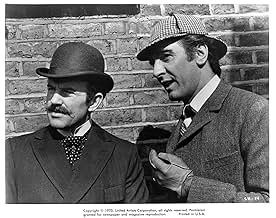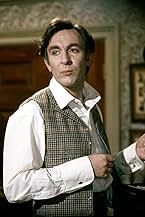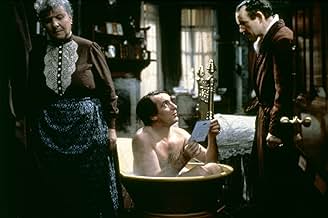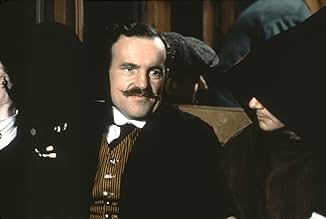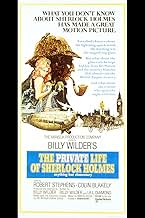La vie privée de Sherlock Holmes
Original title: The Private Life of Sherlock Holmes
- 1970
- Tous publics
- 2h 5m
IMDb RATING
7.0/10
14K
YOUR RATING
When a bored Holmes eagerly takes the case of Gabrielle Valladon after an attempt on her life, the search for her missing husband leads to Loch Ness and the legendary monster.When a bored Holmes eagerly takes the case of Gabrielle Valladon after an attempt on her life, the search for her missing husband leads to Loch Ness and the legendary monster.When a bored Holmes eagerly takes the case of Gabrielle Valladon after an attempt on her life, the search for her missing husband leads to Loch Ness and the legendary monster.
- Director
- Writers
- Stars
- Awards
- 3 nominations total
Geneviève Page
- Gabrielle Valladon
- (as Genevieve Page)
- Director
- Writers
- All cast & crew
- Production, box office & more at IMDbPro
Featured reviews
Sherlock Holmes is certainly one of literature's all-time most famous characters, the subject of countless novels and short stories by Sir Arthur Conan Doyle between 1887 and 1927. Since then, he has become possibly the most portrayed movie character in cinema history {according to the Guinness Book of Records, over 70 actors have played the coveted part in more than 200 films}. So rich was Conan Doyle's description of Holmes that many readers have come to think of him as a historical figure, and derive enjoyment from speculating on the finer detail's of the private detective's life. Likewise, many authors and filmmakers have decided to expand on the stories of Sherlock Holmes, creating new mysteries that perhaps Dr. John Watson forgot to publish. 'The Private Life of Sherlock Holmes (1970)' is such a tale, directed by master filmmaker Billy Wilder, who also produced and co-wrote {with long-time collaborator I.A.L. Diamond} the film.
'The Private Life of Sherlock Holmes' was originally written and filmed as a three-hour roadshow picture, an episodic compilation of Sherlock Holmes' most difficult mysteries. Unfortunately, the studio's unwillingness to take a risk with such a format meant that entire sequences, including a prologue with Watson's grandson in London, and a flashback to Holmes' university years, were inharmoniously cut from the film. Though I was initially unaware of this studio intervention, I met these findings with anger and frustration; while the surviving picture is merely a good film, Billy Wilder's original vision would certainly have been something special. I hear that at least one episode has been restored into later DVD editions of the film, but most of the missing footage remains, devastatingly, permanently absent. The story, as we now find it, is comprised of two unequal portions: the first concerns Holmes' interactions with a glamorous ballet dancer (Tamara Toumanova), casting doubt on the famous detective's sexuality, while the second mystery demonstrates the efforts of Holmes and Watson to locate the husband of an beautiful woman (Geneviève Page) suffering from amnesia.
When little-known British actor Robert Stephens first appeared on screen as Det. Sherlock Holmes, I wasn't certain that he was the suitable man for the job {Wilder had initially considered Peter O'Toole as Holmes, and Peter Sellers as Watson, before deciding to cast unknowns}. However, despite initially appearing too flamboyant to play Conan Doyle's brilliant investigator, I'm happy to say that, by the end of the film, he had well-and-truly grown on me. While Stephens didn't quite match the stories' depiction of Holmes, this is only because Dr. Watson's dramatisations often tend to embellish the truth and misrepresent facts about the detective's personality and demeanour a point that is alluded to early in the film itself. Colin Blakely, though given very little to do, is a lot of fun as Holmes' companion and biographer, playing the role a lot less serious than I've seen it done in the past. Christopher Lee also appears as Holmes' intellectually-equal brother Mycroft, whose associations with the British government may prove crucial to the case being investigated.
'The Private Life of Sherlock Holmes' was originally written and filmed as a three-hour roadshow picture, an episodic compilation of Sherlock Holmes' most difficult mysteries. Unfortunately, the studio's unwillingness to take a risk with such a format meant that entire sequences, including a prologue with Watson's grandson in London, and a flashback to Holmes' university years, were inharmoniously cut from the film. Though I was initially unaware of this studio intervention, I met these findings with anger and frustration; while the surviving picture is merely a good film, Billy Wilder's original vision would certainly have been something special. I hear that at least one episode has been restored into later DVD editions of the film, but most of the missing footage remains, devastatingly, permanently absent. The story, as we now find it, is comprised of two unequal portions: the first concerns Holmes' interactions with a glamorous ballet dancer (Tamara Toumanova), casting doubt on the famous detective's sexuality, while the second mystery demonstrates the efforts of Holmes and Watson to locate the husband of an beautiful woman (Geneviève Page) suffering from amnesia.
When little-known British actor Robert Stephens first appeared on screen as Det. Sherlock Holmes, I wasn't certain that he was the suitable man for the job {Wilder had initially considered Peter O'Toole as Holmes, and Peter Sellers as Watson, before deciding to cast unknowns}. However, despite initially appearing too flamboyant to play Conan Doyle's brilliant investigator, I'm happy to say that, by the end of the film, he had well-and-truly grown on me. While Stephens didn't quite match the stories' depiction of Holmes, this is only because Dr. Watson's dramatisations often tend to embellish the truth and misrepresent facts about the detective's personality and demeanour a point that is alluded to early in the film itself. Colin Blakely, though given very little to do, is a lot of fun as Holmes' companion and biographer, playing the role a lot less serious than I've seen it done in the past. Christopher Lee also appears as Holmes' intellectually-equal brother Mycroft, whose associations with the British government may prove crucial to the case being investigated.
Sherlock Holmes (Robert Stephens) and Dr. Watson (Colin Blakely) get involved in a very weird case involving a mysterious French woman (Geneuieve Page), Sherlock's brother Mycroft (Christopher Lee), midgets, Scotland, the Queen and the Loch Ness Monster! Believe it or not they all come together. I originally saw this on TV back in the late 70s but it was so heavily edited (for instance, the entire first half hour was gone because it dealt with gay characters which was still a taboo on TV back then) that I couldn't follow it and gave up. Now it's back on uncut and I'm glad I'm finally able to see it.
A very strange movie but lots of fun. Some people think this is a spoof. It really isn't but there are some very funny moments--my favorite is at the beginning when Holmes blasts Watson for how he writes about his cases--"Watson, I've never said 'elementary my dear Watson' in my life!""Poetic license Holmes". There's also quite a few funny one liners mostly delivered with great relish by Stephens and it does deal with the sexual relations of Holmes and Watson (it was hinted that they were gay lovers). But it does involve a very serious case and the jokes stop towards the end.
Stephens is actually very good as Holmes--he won't make you forget Basil Rathbone but he's not bad. Colin Blakely isn't as big a buffoon as Nigel Bruce was but he tends to overact a little. Page is just terrible as the mystery woman--but then again, English is her second language. Lee, surprisingly, is kind of stiff as Mycroft. He's a very good actor--I'm surprised to see him so bad.
The movie is very lavish (probably because Billy Wilder was involved)...a lot of money and attention was given to sets and costumes, and they actually went on location to shoot the end in Scotland. The cinematography is just beautiful and the movie was never dull. It doesn't always mix the comedy with the drama successfully but it works more often than it misses. As most people know this was HEAVILY edited before it was released and the uncut version doesn't seem to exist anymore. That's too bad but what remains is not bad. Worth catching...a must see for Holmes fans.
A very strange movie but lots of fun. Some people think this is a spoof. It really isn't but there are some very funny moments--my favorite is at the beginning when Holmes blasts Watson for how he writes about his cases--"Watson, I've never said 'elementary my dear Watson' in my life!""Poetic license Holmes". There's also quite a few funny one liners mostly delivered with great relish by Stephens and it does deal with the sexual relations of Holmes and Watson (it was hinted that they were gay lovers). But it does involve a very serious case and the jokes stop towards the end.
Stephens is actually very good as Holmes--he won't make you forget Basil Rathbone but he's not bad. Colin Blakely isn't as big a buffoon as Nigel Bruce was but he tends to overact a little. Page is just terrible as the mystery woman--but then again, English is her second language. Lee, surprisingly, is kind of stiff as Mycroft. He's a very good actor--I'm surprised to see him so bad.
The movie is very lavish (probably because Billy Wilder was involved)...a lot of money and attention was given to sets and costumes, and they actually went on location to shoot the end in Scotland. The cinematography is just beautiful and the movie was never dull. It doesn't always mix the comedy with the drama successfully but it works more often than it misses. As most people know this was HEAVILY edited before it was released and the uncut version doesn't seem to exist anymore. That's too bad but what remains is not bad. Worth catching...a must see for Holmes fans.
Billy Wilder's take on the world's most famous detective is both painstakingly faithful and sardonically subversive to Sir Arthur Conan Doyle's idiossyncratic creation. Presented as a case that loyal companion John Watson duly recorded but requested remain secret until long after his death, in which Holmes aids a Belgian woman find her missing husband, a mining engineer hired by an apparently non-existant English company, it makes clever use of the rulebook Conan Doyle set down while at the same time undermining it from within. The title and the plot may seem misleading at first - the first half hour especially seems at odds with what comes afterwards - but in fact if you're a Holmes fan you'll quickly realise that this is as close to romance as the detective would ever allow, and Wilder tells it through a masterful accumulation of small touches that only someone as meticulous as the man himself would notice. Script-wise, it's a cracking mystery in the best Doyle tradition, with all the time-honoured twists and turns present and correct. The acting is also up to Wilder's usual standards; Stephens and Blakely are an engaging duo as a bored Holmes and a bumbling Watson, and there's a hysterically funny supporting turn by the always underrated Revill as a Russian ballet impresario. Wilder's trademark pointed cynicism fits the English witticism particularly well, even if at times it all seems a bit too modern for the peaceful Victorian surroundings, but it is quite ironic to see him chiding Britain's stiff-upper-lip, old-fashioned morality when the film seems to be an "old timers' movie" entirely out of sync with its own time. Still, it's hard to find fault in such a thoroughly civilised and delightful entertainment.
This has always been one of my favorite movies. A good take on Holmes, a witty story, a bittersweet ending and music by Miklos Rozsa that sets the tone perfectly. When I saw it had become available on DVD I rushed out and bought it, without even checking to see the extras on the disc. The quality of the print is all right, but there are times it should have been better. The extras just kept getting better. Christopher Lee remembers his times playing Holmes in other films as well as Mycroft in this movie. Then there's the film editor who mentions parts of the movie I never heard of. Then the disc shows the deleted scenes in various forms and it's amazing what was cut. There is only one little bit I feel would have explained things in the movie better, but all the scenes are interesting. A must for people who love this film and want a wealth of information.
What American film makers have done to Sherlock Holmes from the 1970's onwards amounts to celluloid crime. They have inflicted upon us the risible 'Seven per cent solution' and the infantile 'Sherlock Holmes' Smarter Brother' to name but two. We have also had to endure portrayals of the Baker Street sleuth by George C. Scott, Charlton Heston, Robert Downey Jnr. Will Ferrel, Roger Moore, Michael Caine and more recently Ian McKellen as a Holmes with dementia. If that weren't enough we have had the animated 'Sherlock Gnomes' and now heaven help us, Sherlock Holmes' sister!
All of the above are too hideous to contemplate and it is with great relief that I come to Billy Wilder's 'satirical homage' to Conan Doyle's great creation.
Editor Ernest Walter was assigned the unenviable task of reducing the running time by more than half. The question is, did the loss of two stories make it less of a film? Judging by the extracts of 'missing scenes' on You Tube, I think 'not' but will no doubt be shot down in flames for saying so. The inclusion of those scenes would certainly have made it far more of a parody than is the surviving footage but what remains is parody enough in my opinion.
It is the strange mixture of irreverence and homage, satire and sadness that tends to hamper my enjoyment of it.
It begins very well and the scenes involving Imperial Ballet director Rogozhin, superbly played by Clive Revill, the Prima Ballerina Madame Petrova of Tamara Toumanova and the Holmes of Robert Stephens are masterful. We are then introduced to the enigmatic and fascinating Gabrielle Valladon played by the equally enigmatic and fascinating Genevieve Page. After that the film somehow loses focus and momentum and the later scenes in Inverness are distinctly lame and rather childish.
It is only since his death that we have learned how troubled a soul was actor Robert Stephens who reportedly attempted suicide during the making of this. His demeanor suits admirably the director's concept of Holmes as not just an analytical thinking machine but as a mere mortal with the same flaws and hang ups as the rest of us. Wilder's concept of Dr. Watson as an overgrown schoolboy is not really to my taste but Colin Blakely does well enough.
Certainly not to my taste is Christopher Lee as Mycroft. He has the unique distinction of having played Mycroft and Sherlock on film and both portrayals highlight his limitations as an actor. Apparently he was a last minute replacement for the inimitable George Sanders. What a pity.
Actress Mollie Maureen, through no fault of her own, is a grotesque caricature of Queen Victoria whilst the Scottish accent of Stanley Holloway as the gravedigger needs to be heard to be abhorred.
The melancholic, bitter sweet nature of the film is underlined by the music of maestro Miklos Rozsa. He has the taken the more lyrical elements of the Violin Concerto he wrote for Jascha Heifetz in 1956 and incorporated them into one of his greatest scores. Alexandre Trauner's production design is, as always, exemplary.
As one would expect from this director, the verbal takes precedence over the visual and textually reveals Wilder's undeniable respect for and knowledge of Conan Doyle's world.
This material was close to Wilder's heart and he could not fail to be wounded by the critical mauling it received and the total disinterest of cinema goers.
One is inclined to treat it kindly because it comes from Billy Wilder but despite its merits it must alas be considered a 'near miss' as indeed were his subsequent films.
Old directors never die, it is said. They just lose their sense of direction!
All of the above are too hideous to contemplate and it is with great relief that I come to Billy Wilder's 'satirical homage' to Conan Doyle's great creation.
Editor Ernest Walter was assigned the unenviable task of reducing the running time by more than half. The question is, did the loss of two stories make it less of a film? Judging by the extracts of 'missing scenes' on You Tube, I think 'not' but will no doubt be shot down in flames for saying so. The inclusion of those scenes would certainly have made it far more of a parody than is the surviving footage but what remains is parody enough in my opinion.
It is the strange mixture of irreverence and homage, satire and sadness that tends to hamper my enjoyment of it.
It begins very well and the scenes involving Imperial Ballet director Rogozhin, superbly played by Clive Revill, the Prima Ballerina Madame Petrova of Tamara Toumanova and the Holmes of Robert Stephens are masterful. We are then introduced to the enigmatic and fascinating Gabrielle Valladon played by the equally enigmatic and fascinating Genevieve Page. After that the film somehow loses focus and momentum and the later scenes in Inverness are distinctly lame and rather childish.
It is only since his death that we have learned how troubled a soul was actor Robert Stephens who reportedly attempted suicide during the making of this. His demeanor suits admirably the director's concept of Holmes as not just an analytical thinking machine but as a mere mortal with the same flaws and hang ups as the rest of us. Wilder's concept of Dr. Watson as an overgrown schoolboy is not really to my taste but Colin Blakely does well enough.
Certainly not to my taste is Christopher Lee as Mycroft. He has the unique distinction of having played Mycroft and Sherlock on film and both portrayals highlight his limitations as an actor. Apparently he was a last minute replacement for the inimitable George Sanders. What a pity.
Actress Mollie Maureen, through no fault of her own, is a grotesque caricature of Queen Victoria whilst the Scottish accent of Stanley Holloway as the gravedigger needs to be heard to be abhorred.
The melancholic, bitter sweet nature of the film is underlined by the music of maestro Miklos Rozsa. He has the taken the more lyrical elements of the Violin Concerto he wrote for Jascha Heifetz in 1956 and incorporated them into one of his greatest scores. Alexandre Trauner's production design is, as always, exemplary.
As one would expect from this director, the verbal takes precedence over the visual and textually reveals Wilder's undeniable respect for and knowledge of Conan Doyle's world.
This material was close to Wilder's heart and he could not fail to be wounded by the critical mauling it received and the total disinterest of cinema goers.
One is inclined to treat it kindly because it comes from Billy Wilder but despite its merits it must alas be considered a 'near miss' as indeed were his subsequent films.
Old directors never die, it is said. They just lose their sense of direction!
Did you know
- TriviaBy the time of filming, Sir Christopher Lee had become famous as Count Dracula. When he and Billy Wilder walked on the shores of Loch Ness at dusk, with bats circling overhead, Wilder said to him, "You must feel quite at home here."
- GoofsThe events start in August 1887 and apparently take place in the following weeks or, at most, months. However, Mycroft Holmes tells Queen Victoria that Kaiser Wilhelm II had Count Zeppelin working on dirigibles that could drop bombs on Buckingham Palace. Wilhelm II did not become Kaiser until 15 June 1888, and Zeppelin did not start constructing rigid airships until the 1890s.
- Alternate versionsOriginally released at 125 minutes; the US laserdisc version adds 12 minutes of unreleased footage, including a sequence known as "The Dreadful Business of the Naked Honeymooners", featuring Jonathan Cecil and Nicole Shelby
- ConnectionsFeatured in The Many Faces of Sherlock Holmes (1985)
- SoundtracksConcerto for Violin and Orchestra Opus 24
by Miklós Rózsa
Details
- Release date
- Countries of origin
- Languages
- Also known as
- The Private Life of Sherlock Holmes
- Filming locations
- Production companies
- See more company credits at IMDbPro
Box office
- Budget
- $10,000,000 (estimated)
- Gross worldwide
- $19,930
Contribute to this page
Suggest an edit or add missing content

Top Gap
By what name was La vie privée de Sherlock Holmes (1970) officially released in India in English?
Answer

